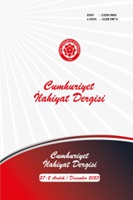Muhâsibî’nin Fehmü’l-Kur’ân’ı Bağlamında Kur’an’ı Anlamanın Neliği/Tefsir İlminin Öncülleri
The Nature of Understanding of the Qur'an in the context of Muhâsibî's Fehmü'lQur'an/ Premises of The Scıence of Interpretation
Author(s): Muhammed İsa YüksekSubject(s): History of Islam, Sociology of Religion, History of Religion, Qur’anic studies
Published by: Cumhuriyet Üniversitesi İlahyat Fakültesi
Keywords: Tafsīr; Qurʾān; Methodology; Muḥāsibī; Fahm al-Qurʾān;
Summary/Abstract: In the field of ʿUlūm al-Qurʾān, in which the conceptual framework of the science of interpretation is drawn and the main rules used in tafsīr are discussed, independent books have been compiled since early periods. Some of these works stand out as foundational texts because they make important determinations about the nature, function, methodology, and relationship of the science of tafsīr with other Islamic sciences. The masterpiece entitled Fahm al-Qurʾān by al-Khāris alMuhāsibī, a scholar of sufism, tafsīr, kalām, and hadīth is one of these books. Al-Muḥāsibī was a writer who lived in a period when philological and Sharīʿah sciences gained a systematic structure and schools were born and developed. Muhāsib'i's multifaceted scholarly depth, the requirements of his time, and the characteristics of his work distinguish Fahm al-Qurʾān from other works in the field in terms of its problematic, content, and style. It can be said that Fahm al-Qurʾān consists of two main chapters. In the first chapter, the issues of kalām, meaning, and reason are subjected to a quiddity inquiry. In the second chapter, the linguistic aspect of kalām is emphasized and the content and style of the Qur'ān are discussed under the headings of muhkam- mutashābih, naskh and üslūb al-Qur'ān. In this work, al-Muḥāsibī suggests that before asking How we should understand the Qur'ān?, the reader should ask What exactly is being understood and what is meaning? The first of these questions includes the question Who am I? While the sources of The Sciences of the Qurʾān mostly focus on how to understand the Qurʾān at the epistemological and methodological level, in Fahm al- Qurʾān, the meaning of understanding the Qurʾān is problematized and a theory of reason and meaning that is competent with moral training is built. Thus, the conceptual inquiries of the work extend to the existential philosophy of the author. Despite these privileges, it is surprising that Fahm al-Qurʾān did not gain a prominent place among the main sources of tafsir methodology in later periods. This may be due to the theorization of a theory of meaning in which moral maturation is placed at the center. In this research, while trying to reveal the original value that Muhāsibī added to the field with Fahm al-Qurʾān, the systematic structure of the science of interpretation, its connection with other religious sciences, the relationship between speech adjective and language were made problematic and tried to be resolved in the context of the research hypothesis. In this context, it has been determined that al-Muḥāsibī's Fahm al-Qurʾān draws the conceptual framework of tafsīr methodology in relation to the authentic structure of the sharī'ah sciences at a very early period. The fact that Fahm al-Qurʾān carries important signs regarding the position of tafsīr in the hierarchy of sciences and its relationship with other sharī'ah sciences increases the value of the work in identifying the codes of the traditional paradigm. In the research, in which induction methods were used in text analysis and deduction methods were used in discourse analysis, it was determined that Fahm al-Qurʾān had a fiction that shapes the traditional paradigm and depicts the authentic structure of religious sciences.
Journal: Cumhuriyet İlahiyat Dergisi
- Issue Year: 27/2023
- Issue No: 2
- Page Range: 538-558
- Page Count: 21
- Language: Turkish

